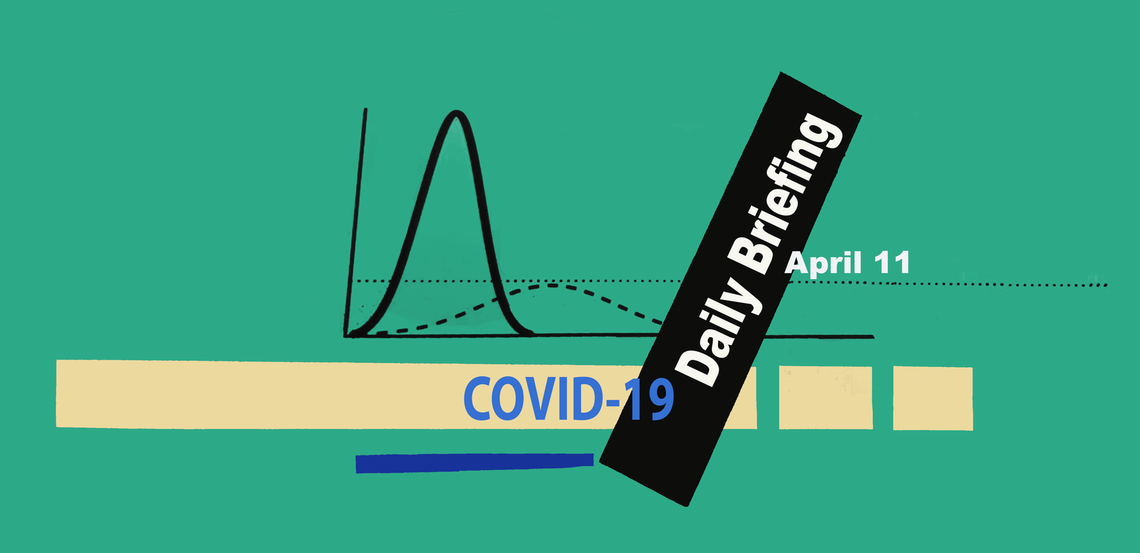
Cumulative Cases: 977
Active Cases: 791
Recovered: 173
Deaths: 13
State of Emergency Likely to Be Extended
1:20 p.m.
In a Facebook live, Prime Minister Nikol Pashinyan spoke about the current situation and next steps. He said that there are 1,705,766 confirmed cases of COVID-19 worldwide; 103,230 people have died and 378,444 have recovered. There are 977 confirmed cases in Armenia, with around 750 active cases, and 13 deaths. “I want to point out that the average age of death from the virus in Armenia is 76.2, the average age of patients is 42,” Pashinyan said.
The state of emergency expires on April 14. However, the Prime Minister said that, following discussions, their view is that the state of emergency needs to be extended. The government will make a final decision on Monday or Tuesday. Following the decision, the parliament will convene in a special session and discuss the issue. “Our stance now is that an extension of the SOE is necessary if we want to prevent the spread of the virus. The epidemic is spreading throughout the world as well as in Armenia and our goal is to have... as few cases as possible.” Growth seems to have leveled off at a range near 30 new cases/day.
Understanding that the economic toll also needs to be mitigated, and that all activity cannot be completely shut down, the Prime Minister announced that, starting Monday and for the duration of the extended SOE period, the following fields of work will be allowed to continue:
-Agriculture, forestry and fish farming
- Mining and work in open pits
- Supply of electricity, gas, steam and cool air
- Water supply, sewage, waste management and recycling
- Warehousing and transport ancillary activities
- Financial and insurance activity
- State administration and protection; compulsory social security
- Health and social services for people
- Activities of foreign organizations
- Open air construction
- Tobacco production
A week later, after April 20, the goal is to allow textile production and retail, shops selling household items and scientific research to return to work.
Consultations are needed to discuss preventative measures, especially in textile production as it was the source of a large number of infections in the country, Pashinyan said, adding that on the other hand, they understand that people need to work. Thereby, they will work with industry representatives to help them reorganize their work “in the safest possible way.”
Several days of national significance are on the horizon. April 24 is in two weeks and early May marks Shushi Liberation Day and Victory Day [a holiday that commemorates the surrender of Nazi Germany in 1945]. Citizens’ participation at commemorative events will have to be limited to ward off a resurgence of the virus. On April 24, only official protocol ceremonies will be allowed. The same holds true for May 8 and 9. There will be no public events on May 1 (Labor Day). “I hope and I ask our citizens to be understanding of our decisions, which have only been taken to protect citizens and is not an effort to curtail any rights or wishes,” Pashinyan said.
The state of emergency regime will continue to be strictly enforced but Pashinyan pleaded for citizens to comply voluntarily, with the goal of saving human lives, adding that the government’s approach to the situation has been balanced.
Public transportation will be completely shut down as it is a high risk vector for spreading the virus. Transportation of employees may need to be organized and financed by employers, not to put additional financial strain on workers. Inter-regional transportation will be prohibited for at least another week. Taxis will be allowed to operate in Yerevan as well as the regions. The use of personal vehicles will be allowed with restrictions that will soon be announced by the special commission.
The government has already initiated ten assistance programs. As of yesterday, 12.3 billion AMD has already been allocated to beneficiaries. 4,978 businesses have already received financial assistance; 11,444 families have received social assistance. It is expected that about 100,000 people will become beneficiaries of the social assistance programs. “Our daily discussions continue,” Pashinyan said. “We want to make sure to reach every citizen in need of assistance.”
As the economy slowly begins to open up, providing additional relief, citizens will have to act responsibly to avoid a return to stricter restrictions. A new wave of infections could explode again at any time the Prime Minister said.
“I want to point out that the fact that we now have a relatively smaller number of infections and allowing more industries to go back to work does not mean that we are in a better state, epidemiologically we are at a more stable place but it has not improved and we can, at any moment, still have a new wave of infections which could cause bigger problems for us,” Pashinyan noted.
The Prime Minister apologized for the inconveniences caused, saying that all have suffered in their own way. Additional assistance programs are still being considered to soften the economic blow. He said, “At the end of the day, it is the sense of personal responsibility that each of us exhibits that will help us come out of the situation with minimal loss.”
Pashinyan closed by thanking the Armenian Apostolic Church for their understanding, for deciding to conduct the upcoming Easter service behind closed doors and for joining the call to stay home.
The Daily Update
11 a.m.
The Ministry of Health informs that there are 29 new confirmed cases of COVID-19 in Armenia, bringing the number to 966. 24 patients have recovered, bringing the total number of recoveries to 173.
Two patients, 86 and 81 years old, passed away on April 10 (one was already announced). The ministry said both suffered from pre-existing conditions. This brings the COVID-19 related deaths in the country to 13.


